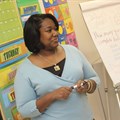These statistics, the former from the Department of Higher Education & Training’s 2020 Report on Adult Illiteracy and the latter from the 2023 Background Report for the 2030 Reading Panel, paint a grim picture of South Africa’s ability to teach basic literacy and foster a culture of reading.
This is not a uniquely South African problem, though – a Statista report on global adult and child literacy shows that the global literacy rate amongst adults reached 86.8% in 2020 – up from 67% in 1976. It details that the reasons for these differences are rooted in economic and cultural differences in countries in Africa and South Asia.
Unesco established World Book and Copyright Day on 23 April 1995 and mark the annual event as a way of promoting the enjoyment of books and reading. Celebrations take place to recognise the scope of books - a link between the past and the future, a bridge between generations and across cultures. 23 April is a symbolic date in world literature – one on which prominent authors including William Shakespeare, Miguel de Cervantes and Inca Garcilaso de la Vega, all died.
Lea-Anne Moses,
Fundza 6 Apr 2023 Several literacy projects run by NGOs and the government are being implemented in South Africa to narrow the literacy gap. MySchool MyVillage MyPlanet is currently providing support to various beneficiaries in the country such as The Link, Ripple Reading, The Bookery, Shine Literacy, Book Dash, and Biblionef South Africa.
Biblionef South Africa operates according to Unesco’s Book Donation Charter and donates new storybooks in all 11 languages to schools and children’s organisations throughout South Africa for children aged 3 to 18. The organisation supports endeavours to improve literacy levels, establish a reading culture and help create the right circumstances to foster a love of reading.
Book Dash is a not-for-profit, South African social impact publisher of open, African picture books for very young children. The organisation gathers creative professionals who volunteer to create new, African storybooks that anyone can freely translate and distribute. Their unique, 12-hour book-making methodology allows them to create beautiful new books in just one day, which are then shared via their website and in physical format for children to own.
Shine Literacy aims to create a culture of reading by engaging parents, caregivers and the greater community where children live, play, learn and thrive. At the heart of all our programmes are two simple beliefs that every child is unique and has infinite potential and that only by working in partnership with others can they accomplish their vision of a nation of readers.
The Bookery identifies schools that need libraries and partners with them to build vibrant and well-stocked libraries for their learners. They seek funding to help cover the costs of setting up the libraries; stock the libraries with a range of fiction, non-fiction and reference books with help from professional librarians and employ trained library assistants to care for and grow the libraries.
Ripple Reading focuses on literacy and leadership development of children in disadvantaged communities. They are building a model of effective intervention to teach children to read with understanding. Their vision is to assist learners to attain a level of academic performance which will enable them to take control of their futures – academically, emotionally and socially. The programme is based on using all learning modalities with emphasis on visual, auditory and tactile perceptual development.
The Link Literacy Project supports the development of literacy and numeracy in children for whom English is a second language and who attend low income schools in Johannesburg. The organisation is managed and staffed by community volunteers who are committed to making a difference in education and who enjoy working with children. They provide basic training and all the resources required to help train volunteers work with children in Grades 2 & 3 who are identified by valid testing to be at risk of not achieving their potential.
These are a few of the many simple ways you can get involved and show your support for literacy this World Book Day.























































